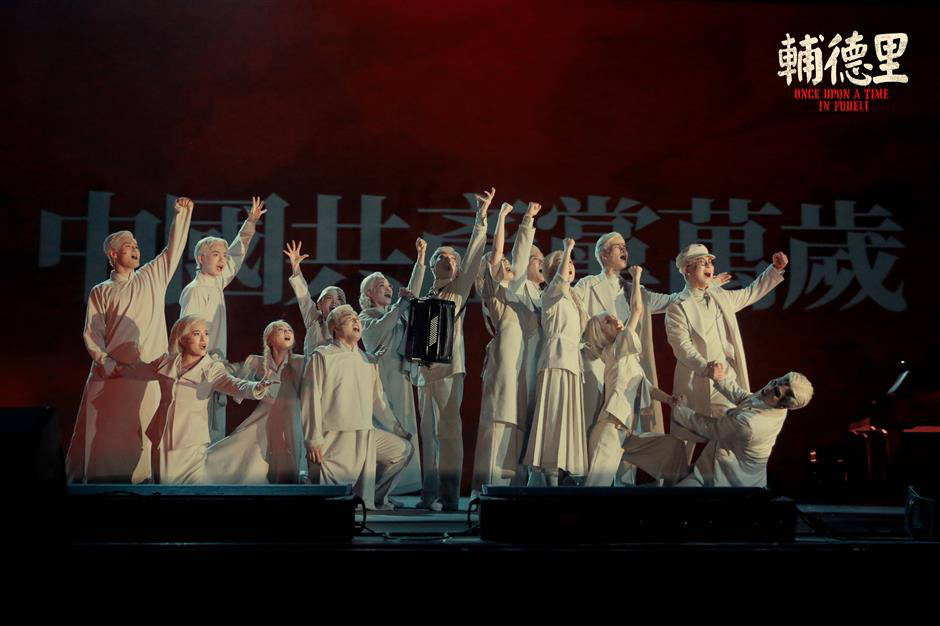
Forgotten yet prominent figures, solemn yet heart-stirring stories in China’s revolutionary history were reawakened in Jing’an’s first original “red” drama “Once Upon A Time in Fudeli.”
On April 23, the play made its debut at the Daning Theatre and opened this year’s Modern Drama Valley. It shows the persistence and sacrifice of patriots, revolutionaries and early members of the Communist Party of China a century ago, telling stories of the Party’s early days and China’s winding journey toward national rejuvenation.
It is set against the backdrop of Shanghai’s Fudeli neighborhood where the Party’s Second National Congress was held. Legendary figures such as Mao Zedong and his wife Yang Kaihui are brought back to life on stage.
In July 1922, 12 Party delegates gathered in secret at the residence of Li Da in the shikumen (stone-gate housing) neighborhood Fudeli in Jing’an, one of few remaining clandestine Party sites in the city following a series of police raids.
They include major Party co-founders Chen Duxiu, Zhou Enlai’s classmate Li Zhenying and early Party leader Cai Hesen.
In a footnote to history, Mao was supposed to attend the meeting but he didn’t make it. In a conversation with American journalist Edgar Snow in 1936, he said he just forgot the exact address and couldn’t find any comrades to enlighten him.
Over eight days, the 12 delegates shaped the first Party Constitution, which consisted of six chapters and 4,000 words.
In the early 1920s, members of the ruling Kuomintang greatly outnumbered the newly-founded Chinese Communist Party which only had about 200 members across the nation in 1922. It forced the Party to engage mostly in underground activities.
So, the Party secretly handed out copies of important documents to its early members, including Zhang Renya, for better protection.
In the winter of 1927, Zhang spirited them to safety in his hometown in Ningbo in Zhejiang Province. Five years later, he died of illness.
The precious documents saw the light of day after the founding of the People’s Republic of China. They include the first edition of the Party Constitution.
Fudeli also witnessed the establishment of the People’s Publishing House, which has survived to this day as one of the most reputable publishers in China.
Li and his wife Wang Huiwu established it as a one-man workshop in a narrow space underneath the staircase of the house, near the kitchen.
It is said that Li was so smart that he disguised Party propaganda leaflets as New Year’s cards, and he hid the leaflets in the firewood pile in the kitchen ahead of police raids.
After the premiere in Shanghai, the play is scheduled to tour cities in East China, including Nanjing, Hefei, Wuxi and Yantai, and will return to Shanghai in June.
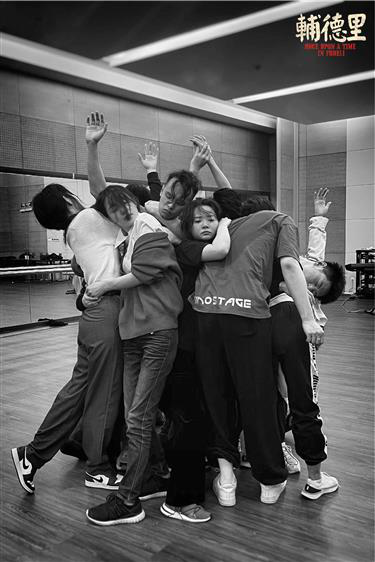
Actors rehearse for drama “Once Upon A Time in Fudeli.”
Ask The Crew
Q: What is the drama about?
A: It is the first theater play focusing on the Party’s Second National Congress and the first Party Constitution. Set in Shanghai’s Fudeli neighborhood in Jing’an, it tells the stories of major figures in Party history including Chen Duxiu, Li Da, Wang Huiwu, Mao Zedong, Yang Kaihui, Cai Hesen, Xiang Jingyu and Zhang Renya.
Q: How do you make red drama attractive to today’s young audiences?
A: All of our performers are post-90s, the generation born after 1990, and it’s such a coincidence that most of the 12 delegates to the Party’s Second National Congress were also post-90s, the generation born after 1890. It’s a conversation between two post-90s generations over a century. Also, music plays a big part in our play because it can easily touch hearts. Musician Li Jingjian composed sonatas especially for our play.
Q: Did you dig out anecdotes and stories in the process of playwriting?
A: Of course. Zhang Renya’s story has greatly impressed us. In the winter of 1927, he spirited the Party’s founding documents, including the first edition of Party Constitution, safety in Ningbo. When he returned to Shanghai, his father built a cenotaph in Zhang’s name and buried the documents inside, falsely claiming that his son was dead. His family never heard from him again. They looked for him for over a half century. In 2005, they found news of his death in an old newspaper. Until then, they knew that he had passed away in 1932 due to serious illness. After learning that story, we visited his former residence and grave in Ningbo.
Q: How historically accurate is the play?
A: The play was written based on true stories and historical documents. For example, it mentions Yang Kaihui’s love letters to Mao Zedong. They are among a collection of her manuscripts found in her former residence in Bancang in Hunan Province, where she was arrested in October 1930.
Party history in miniature
A miniature exhibition showing the 16 important historical moments around the Party’s Second National Congress was held this month at 63 Anyi Road, where Mao Zedong lived from May to July in 1920.
The exhibition features miniature models of Shanghai’s shikumen stone-gate buildings and replicas of scenes such as the Party’s first and second National Congress.
It’s in the city’s shikumen where pioneering revolutionaries struggled for the nation’s rejuvenation in the early days.
Twenty young artists from the China Academy of Art made the miniature creations to pay tribute to their peers back in the 1920s. Let’s have a look:
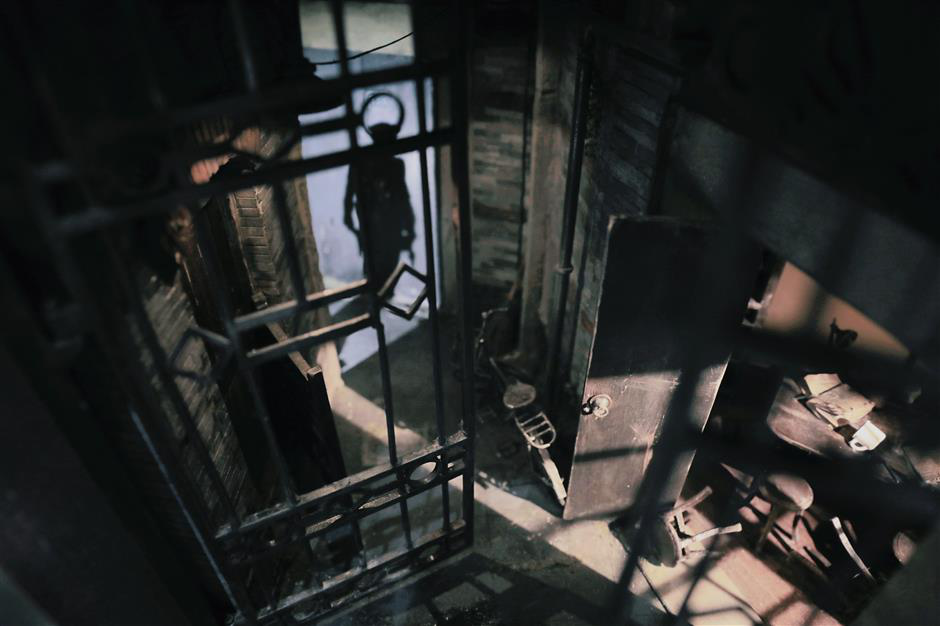

June 30, 1921
The Party’s First National Congress was held at Shudeli in Shanghai.
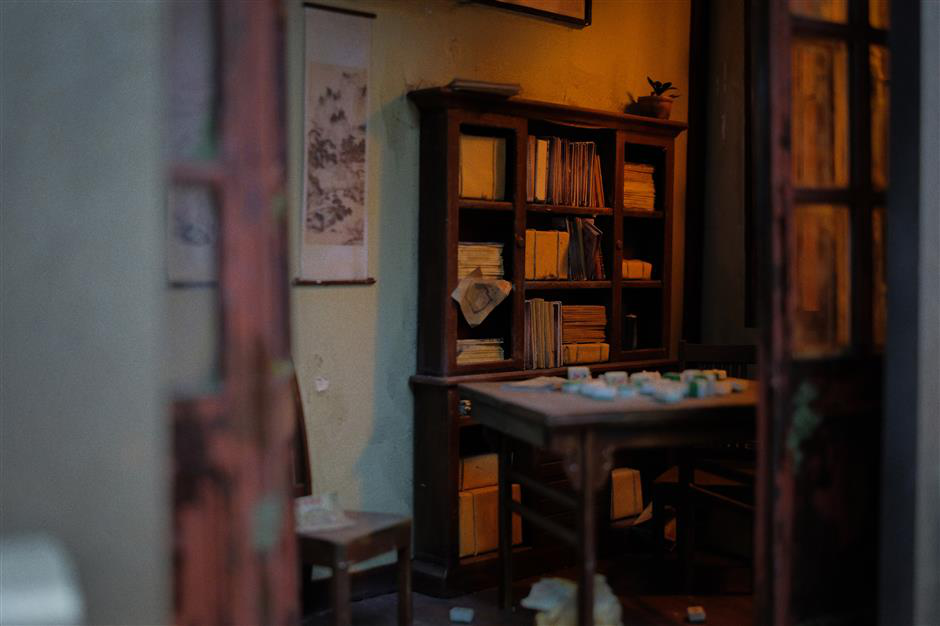
October 4, 1921
Chen Duxiu was arrested in Mingdeli in Shanghai.
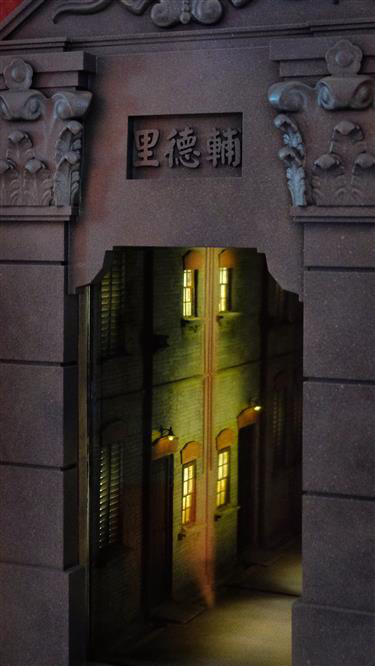
July 16, 1922
The Party’s Second National Congress was held at Fudeli in Shanghai.
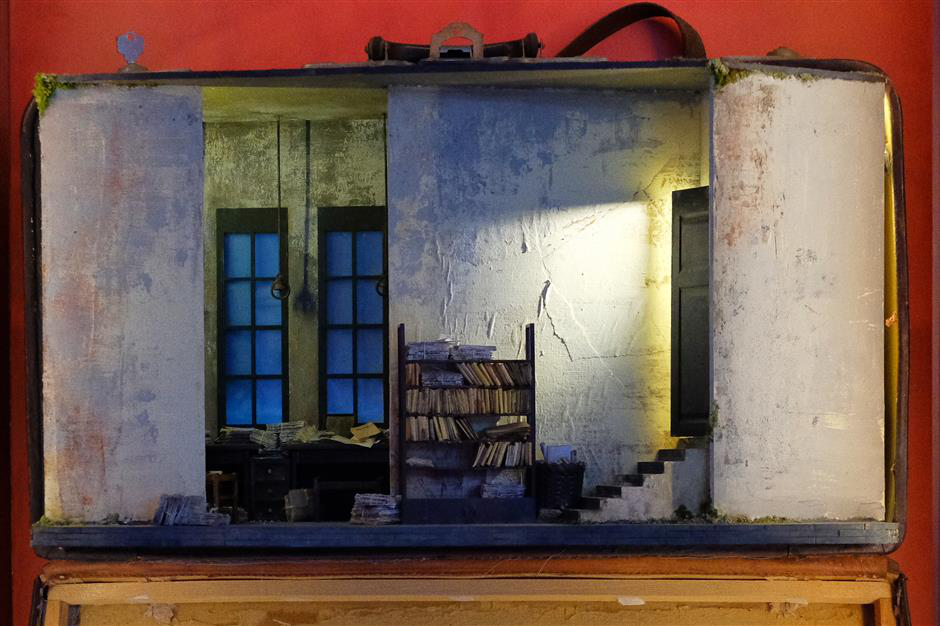
July 16, 1922
The first Party Constitution was drafted at Fudeli in Shanghai.
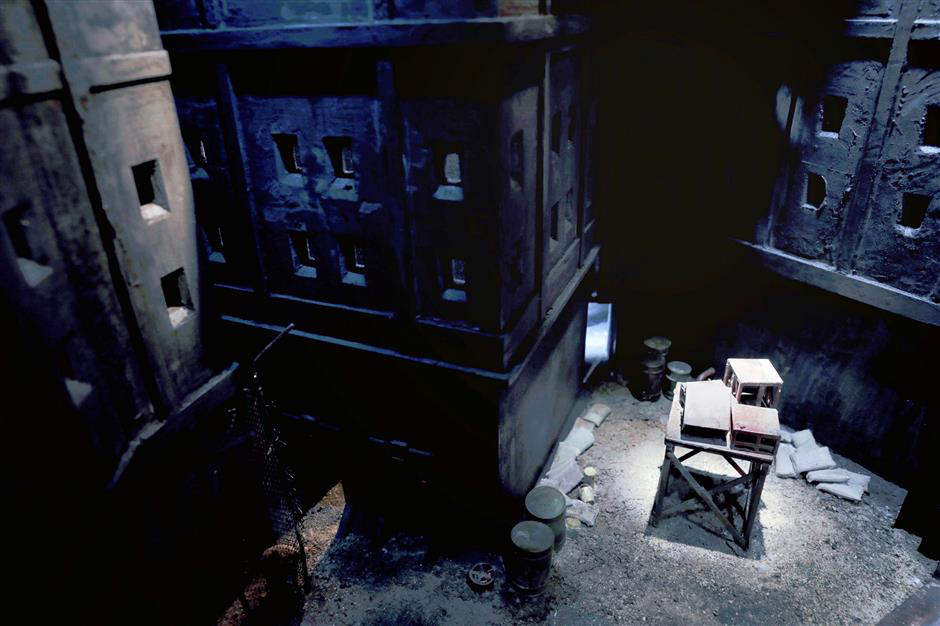
May 1, 1928
Xiang Jingyu was killed in Wuhan in Hubei Province.
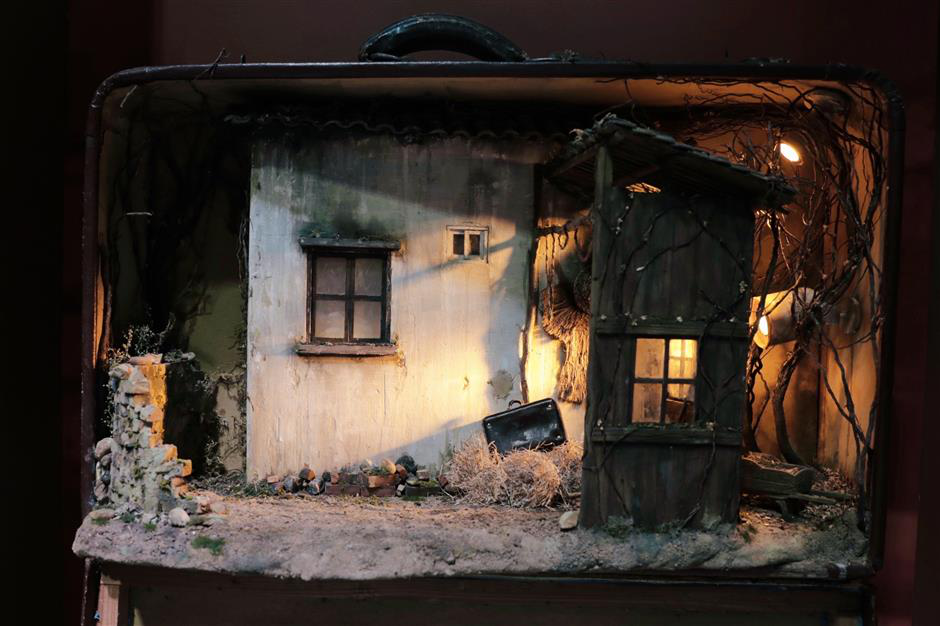
Winter of 1927
Zhang Renya gave vital Party documents to his father in Ningbo.
Modern Drama Valley
This year’s Modern Drama Valley, which runs through May 10, will present 20 productions — over 80 percent of them making their Shanghai debut.
Productions include “Copenhagen,” presented by the National Theater of China, Samuel Beckett’s “Waiting For Godot,” directed by Yi Liming, and “The Gadfly,” newly adapted by the Guangzhou Drama Art Center.
Over the festival period, 200 street theater performances, including puppetry, stilt walkers and clown shows, will be staged at popular venues and bustling commercial zones, such as Jing’an Park, HKRI Taikoo Hui and the Daning Music Plaza.
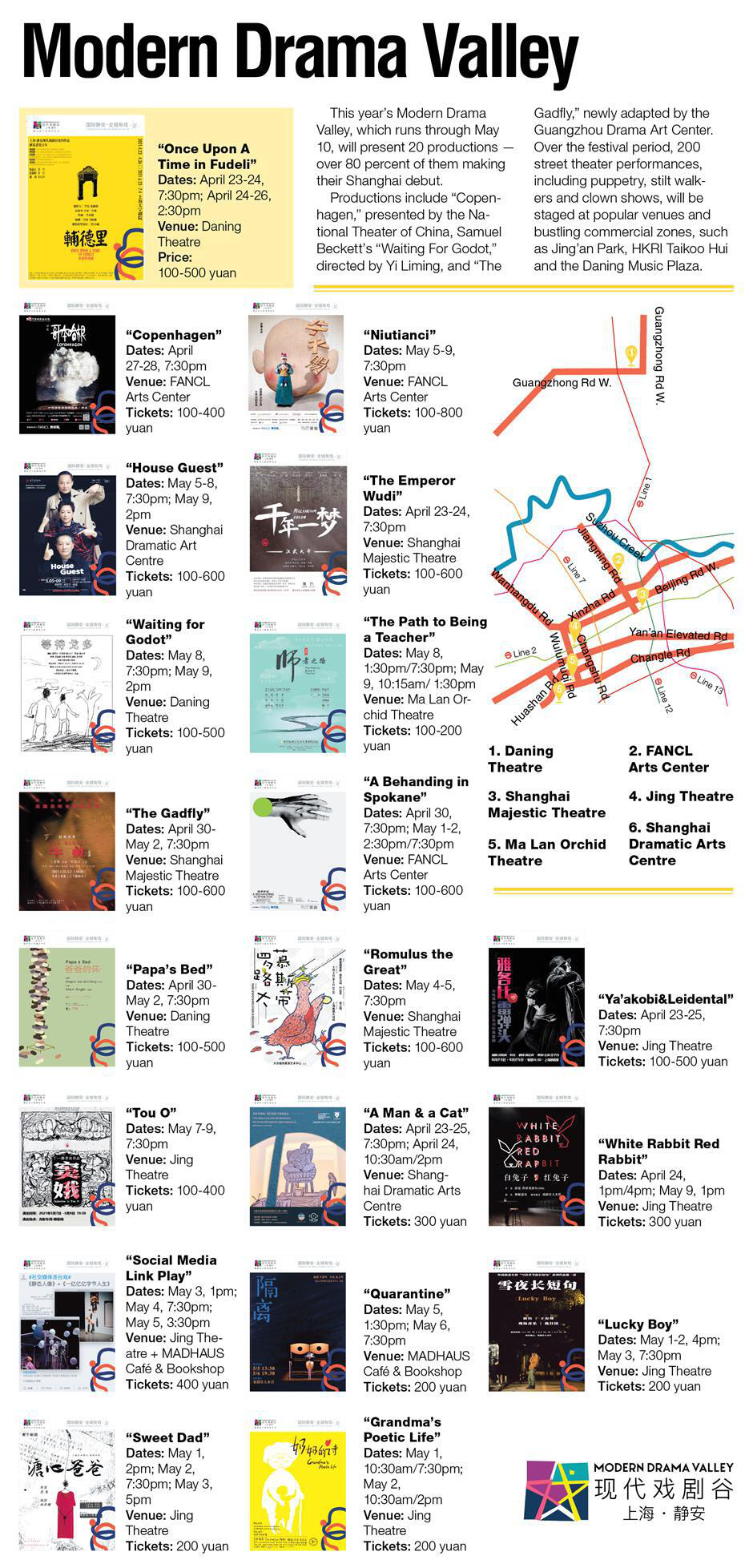




 A single purchase
A single purchase









